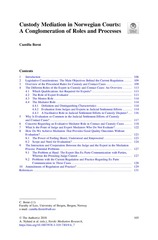Custody Mediation in Norwegian Courts. A Conglomeration of Roles and Processes
Chapter, Peer reviewed
Published version

Åpne
Permanent lenke
https://hdl.handle.net/1956/20758Utgivelsesdato
2018Metadata
Vis full innførselSamlinger
- Faculty of Law [2479]
Originalversjon
https://doi.org/10.1007/978-3-319-73019-6_7Sammendrag
In this article, I critically examine the judicial settlement scheme in custody and contact cases in Norway. The scheme is called mediation by the legislator, but it takes place as an integrated part of preparatory hearings in district courts. In most cases, an expert, typically a psychologist, is appointed to assist the judge. The role of these third parties varies but often they co-mediate. However, the expert can also be appointed as a mentor to the parents if they enter into interim settlements. If the case is not settled in the preparatory phase, the expert may provide the court with an evaluation of the quality of care each parent has to offer and the best interests of the children. The judge, on the other hand, is meant to preside over the main hearing should the settlement efforts not succeed and must, therefore, not say or do anything that is liable to impair his or her impartiality. The judge and the expert often use fairly evaluative techniques when promoting settlement. This so-called mediation scheme and the procedural rules and practices connected with it have been criticised, in particular, for the use of a single expert in several roles and for the unpredictable process that ensues from preparatory hearings with multiple purposes. A main concern is that there is an undue settlement pressure. At the end of this article, I propose amendments of regulation and practice.
